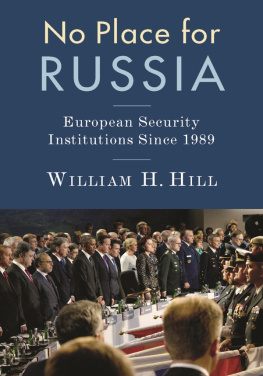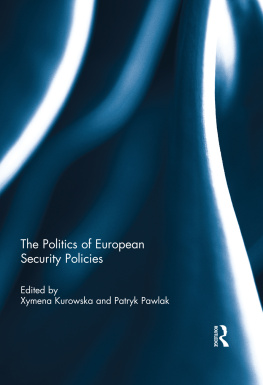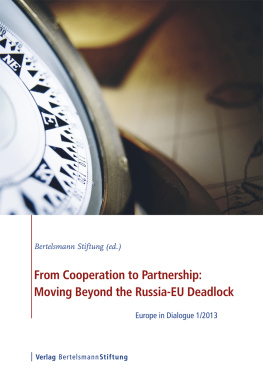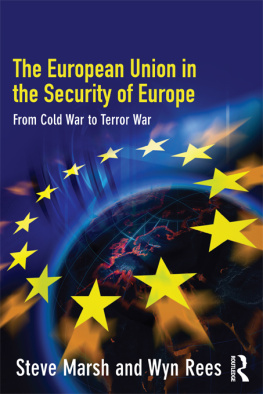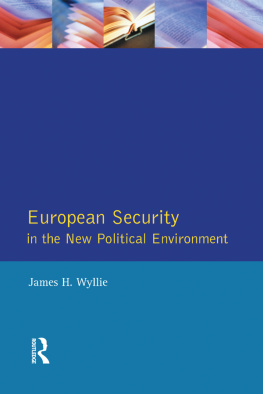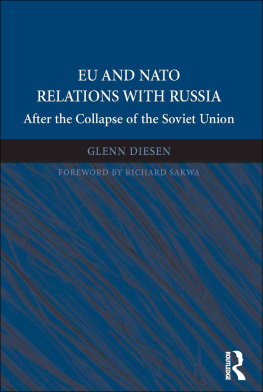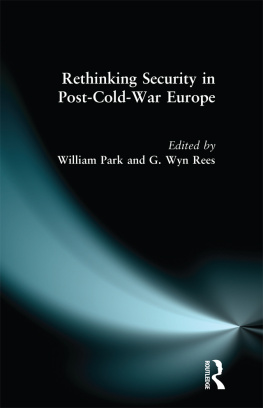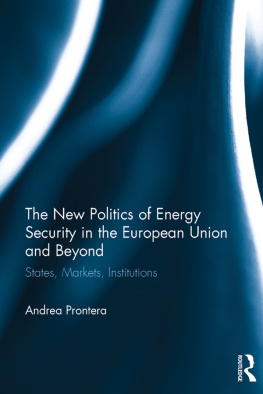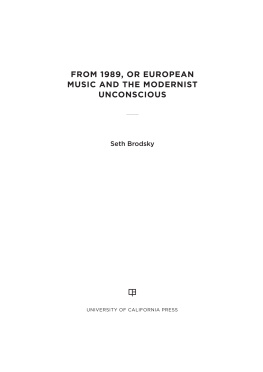WOODROW WILSON CENTER SERIES
The Woodrow Wilson International Center for Scholars was chartered by the U.S. Congress in 1968 as the living memorial to the nations twenty-eighth president. It serves as the countrys key nonpartisan policy forum, tackling global challenges through independent research and open dialogue. Bridging the worlds of academia and public policy, the Centers diverse programmatic activity informs actionable ideas for Congress, the administration, and the broader policy community.
The Woodrow Wilson Book Series shares in the Centers mission by publishing outstanding scholarly and public-policy-related books for a global readership. Written by the Centers expert staff and international network of scholars, our books shed light on a wide range of topics, including U.S. foreign and domestic policy, security, the environment, energy, and area studies.
Conclusions or opinions expressed in Center publications and programs are those of the authors and speakers and do not necessarily reflect the views of the Center staff, fellows, trustees, advisory groups, or any individuals or organizations that provide financial support for the Center.
Please visit us online at www.wilsoncenter.org.
Columbia University Press
Publishers Since 1893
New York Chichester, West Sussex
cup.columbia.edu
Copyright 2018 Columbia University Press
All rights reserved
E-ISBN 978-0-231-80142-3
Cataloging-in-Publication Data is available from the Library of Congress.
ISBN 978-0-231-70458-8 (cloth)
ISBN 978-0-231-80142-3 (e-book)
A Columbia University Press E-book.
CUP would be pleased to hear about your reading experience with this e-book at .
Cover design: Guerrilla Design
Cover image: Alain Jocard/GettyImages
This volume began more than fifteen years ago as a study of the relationship between NATO and the Organization for Security and Cooperation in Europe (OSCE), with a fellowship with the Eastern European Program at the Woodrow Wilson International Center for Scholars. I was able to pursue this project further, after a stint as head of the OSCE Mission to Moldova, during a 20012 term as a Public Policy Scholar at the Wilson Center, funded by a grant from the US Institute of Peace. I somewhat unexpectedly served a second, longer term as head of the OSCE Mission to Moldova from 2003 to 2006. This experience diverted my attention somewhat, and eventually led to a book on the Moldova-Transdniestria conflict and Russias relations with its former Soviet neighbors in the near abroadRussia, the Near Abroad, and the West: Lessons from the Moldova-Transdniestria Conflictpublished by the Woodrow Wilson Center Press and Johns Hopkins University Press in 2012.
In writing this volume, I returned to my original project of describing and analyzing Europes security institutions and postCold War security order. However, by that time the European Union had clearly become a much more important security actor, a fact that had been imprinted on my consciousness through extensive work with the EU as an OSCE official during the 2000s.
With the support of a sabbatical during 201415 from the National War College and the generosity of the Kennan Institute of the Woodrow Wilson Center in hosting me during this time as a Public Policy Scholar, I was able to put the finishing touches on the research for this book and do the bulk of the writing.
I am indebted to many individuals and institutions for assistance, advice, and enlightenment during the work that went into the research, preparation, and writing of this volume. My mentor in the foreign service, the late Ambassador Warren Zimmermann, introduced me to the Conference on Security and Cooperation in Europe as his executive assistant with the US Delegation to the Vienna Follow-Up Meeting in 1986, which began an ongoing association with the CSCE/OSCE that has lasted thirty years and counting. The late Ambassador Robert Frowick, who served as Zimmermanns deputy at the Vienna meeting and had also served at NATO Headquarters, first introduced me to the intricate interrelationships of these European security institutions. The late Ambassador Samuel Wisea retired foreign service officer and chief of staff of the US Congresss Commission on Security and Cooperation in Europe, or Helsinki Commission, and Zimmermanns other deputy at the Vienna meetinggave me a thorough education and grounding in the history, unwritten traditions, procedures, and practices of the Helsinki Process. Along with Sam, Helsinki Commission staff memberssuch as Lynn Davidson, Bob Hand, Ron McNamara, Orest Deychiakiwski, John Finerty, and Kyle Parkerhave been friends, colleagues, and examples of the significant, constructive role the OSCE could play in US foreign policy and European security.
There are too many colleagues and friends to enumerate from the US Department of State, US Department of Defense, and National Security Council staff, and from numerous European foreign and defense ministries and legislatures, all of whom helped me to understand how NATO, the EU, and the OSCE work, and the diverse national strategic cultures that interact in the development of European and Euro-Atlantic institutions. Many of these colleagues from North America and Europe were kind enough to discuss with me and share their insights and understanding of specific institutions, issues, or events I have described and analyzed in this book. My debts to specific individuals for understanding particular issues or events are reflected in the notes. However, it is difficult to overemphasize the contribution of these numerous unnamed colleagues to the development of my own practitioners understanding of international relations and security institutions.
Washington provides a particularly rich environment of academic and institutional experts on the major national and institutional actors in Euro-Atlantic security affairs, and I have benefited immensely from working with many of these experts since my return to the United States from Moldova in August 2006. For their careful reading and comments on the manuscript, I am especially grateful and deeply indebted to my Foreign Service colleague from Moscow and Washington, Wayne Merry; to one of my successors at the OSCE Mission to Moldova, Philip Remler; to my Foreign Service colleague from Washington, Moscow, Brussels, and Vienna, Paul Fritch; and to my friend, Terry Hopmann, of the Paul H. Nitze School of Advanced International Studies at Johns Hopkins University. In addition, I am indebted to Christian Nuenlist of the Zurich Center for Security Studies for his detailed reading and thoughtful comments on the manuscript. I owe a great deal to my colleague at the National War College, James MacDougall, for the insights, understanding, and wisdom I gained from him in numerous discussions of relations between the United States and Russia and the future of European security. I also wish to thank my colleagues at the National Defense University, Cynthia Watson of the National War College, and Elena Pokalova of the College of International Security Affairs for their careful reading of and helpful comments on the manuscript.





